Developing Therapeutic Alliances in Mental Health Nursing, Semester 1
VerifiedAdded on 2022/12/27
|7
|1862
|1
Essay
AI Summary
This essay delves into the core of mental health nursing, specifically focusing on the development of therapeutic relationships between nurses and patients diagnosed with depression. The essay is structured to address two key questions: how nurses cultivate these essential alliances and why they are crucial in patient care. It explores various strategies employed by nurses, including consistent communication, empathy, maintaining confidentiality, and fostering trust, all supported by evidence-based literature. The essay highlights the significance of therapeutic alliances in improving patient outcomes, enhancing patient experiences, and promoting active patient involvement in their treatment. Furthermore, it emphasizes the role of these relationships in facilitating better understanding of patients' feelings and perceptions, leading to more effective interventions and improved overall well-being. The essay references multiple scholarly articles and clinical studies to support its arguments, providing a comprehensive overview of the subject.
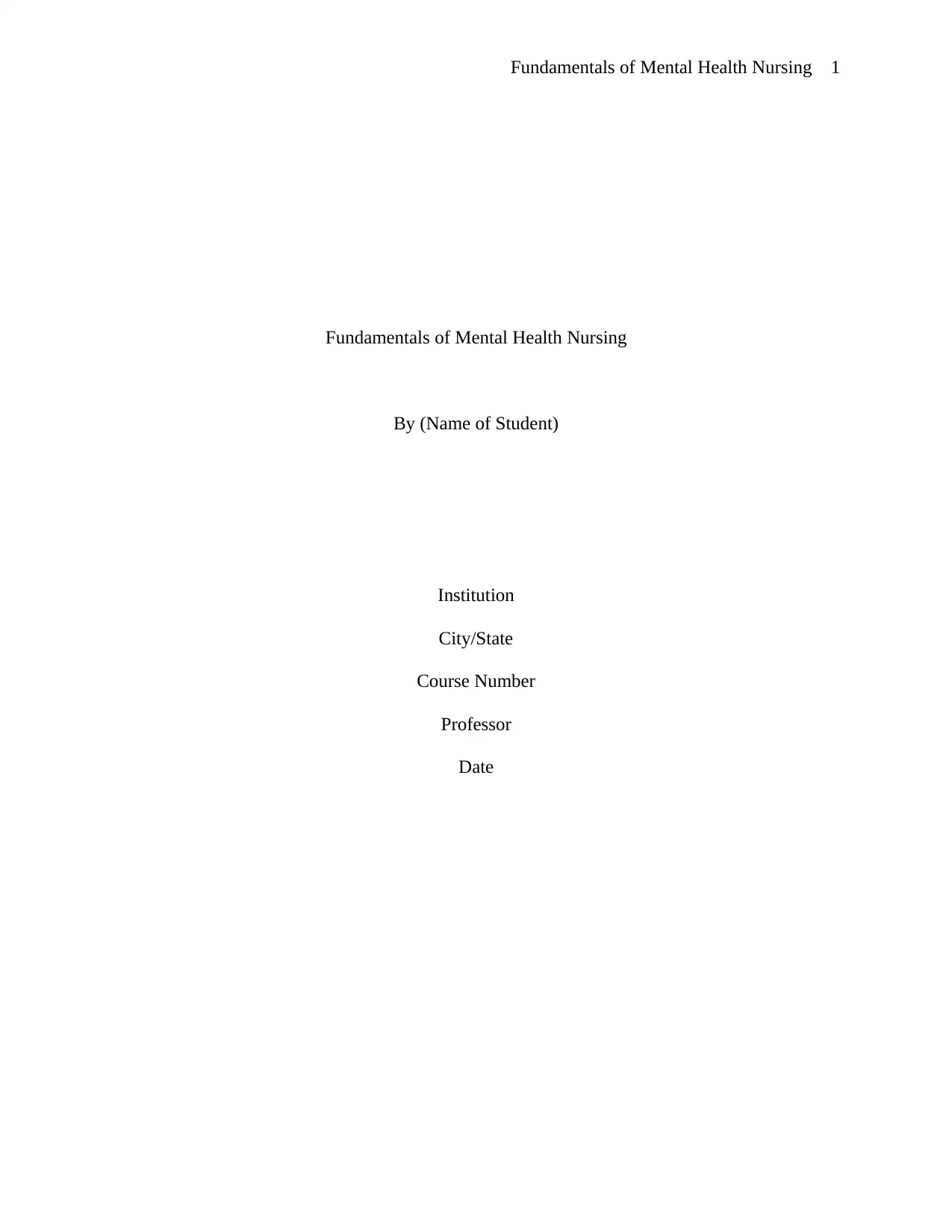
Fundamentals of Mental Health Nursing 1
Fundamentals of Mental Health Nursing
By (Name of Student)
Institution
City/State
Course Number
Professor
Date
Fundamentals of Mental Health Nursing
By (Name of Student)
Institution
City/State
Course Number
Professor
Date
Paraphrase This Document
Need a fresh take? Get an instant paraphrase of this document with our AI Paraphraser
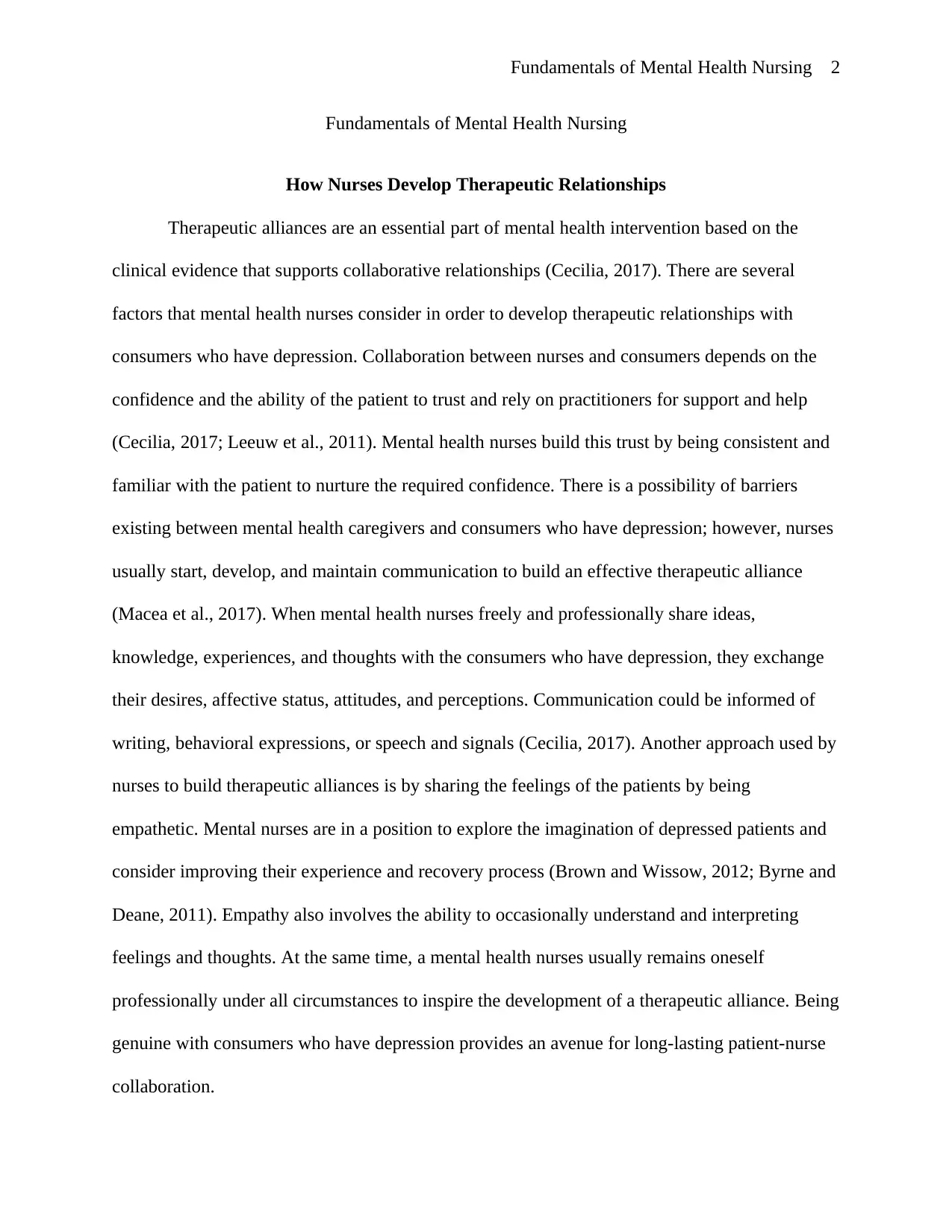
Fundamentals of Mental Health Nursing 2
Fundamentals of Mental Health Nursing
How Nurses Develop Therapeutic Relationships
Therapeutic alliances are an essential part of mental health intervention based on the
clinical evidence that supports collaborative relationships (Cecilia, 2017). There are several
factors that mental health nurses consider in order to develop therapeutic relationships with
consumers who have depression. Collaboration between nurses and consumers depends on the
confidence and the ability of the patient to trust and rely on practitioners for support and help
(Cecilia, 2017; Leeuw et al., 2011). Mental health nurses build this trust by being consistent and
familiar with the patient to nurture the required confidence. There is a possibility of barriers
existing between mental health caregivers and consumers who have depression; however, nurses
usually start, develop, and maintain communication to build an effective therapeutic alliance
(Macea et al., 2017). When mental health nurses freely and professionally share ideas,
knowledge, experiences, and thoughts with the consumers who have depression, they exchange
their desires, affective status, attitudes, and perceptions. Communication could be informed of
writing, behavioral expressions, or speech and signals (Cecilia, 2017). Another approach used by
nurses to build therapeutic alliances is by sharing the feelings of the patients by being
empathetic. Mental nurses are in a position to explore the imagination of depressed patients and
consider improving their experience and recovery process (Brown and Wissow, 2012; Byrne and
Deane, 2011). Empathy also involves the ability to occasionally understand and interpreting
feelings and thoughts. At the same time, a mental health nurses usually remains oneself
professionally under all circumstances to inspire the development of a therapeutic alliance. Being
genuine with consumers who have depression provides an avenue for long-lasting patient-nurse
collaboration.
Fundamentals of Mental Health Nursing
How Nurses Develop Therapeutic Relationships
Therapeutic alliances are an essential part of mental health intervention based on the
clinical evidence that supports collaborative relationships (Cecilia, 2017). There are several
factors that mental health nurses consider in order to develop therapeutic relationships with
consumers who have depression. Collaboration between nurses and consumers depends on the
confidence and the ability of the patient to trust and rely on practitioners for support and help
(Cecilia, 2017; Leeuw et al., 2011). Mental health nurses build this trust by being consistent and
familiar with the patient to nurture the required confidence. There is a possibility of barriers
existing between mental health caregivers and consumers who have depression; however, nurses
usually start, develop, and maintain communication to build an effective therapeutic alliance
(Macea et al., 2017). When mental health nurses freely and professionally share ideas,
knowledge, experiences, and thoughts with the consumers who have depression, they exchange
their desires, affective status, attitudes, and perceptions. Communication could be informed of
writing, behavioral expressions, or speech and signals (Cecilia, 2017). Another approach used by
nurses to build therapeutic alliances is by sharing the feelings of the patients by being
empathetic. Mental nurses are in a position to explore the imagination of depressed patients and
consider improving their experience and recovery process (Brown and Wissow, 2012; Byrne and
Deane, 2011). Empathy also involves the ability to occasionally understand and interpreting
feelings and thoughts. At the same time, a mental health nurses usually remains oneself
professionally under all circumstances to inspire the development of a therapeutic alliance. Being
genuine with consumers who have depression provides an avenue for long-lasting patient-nurse
collaboration.
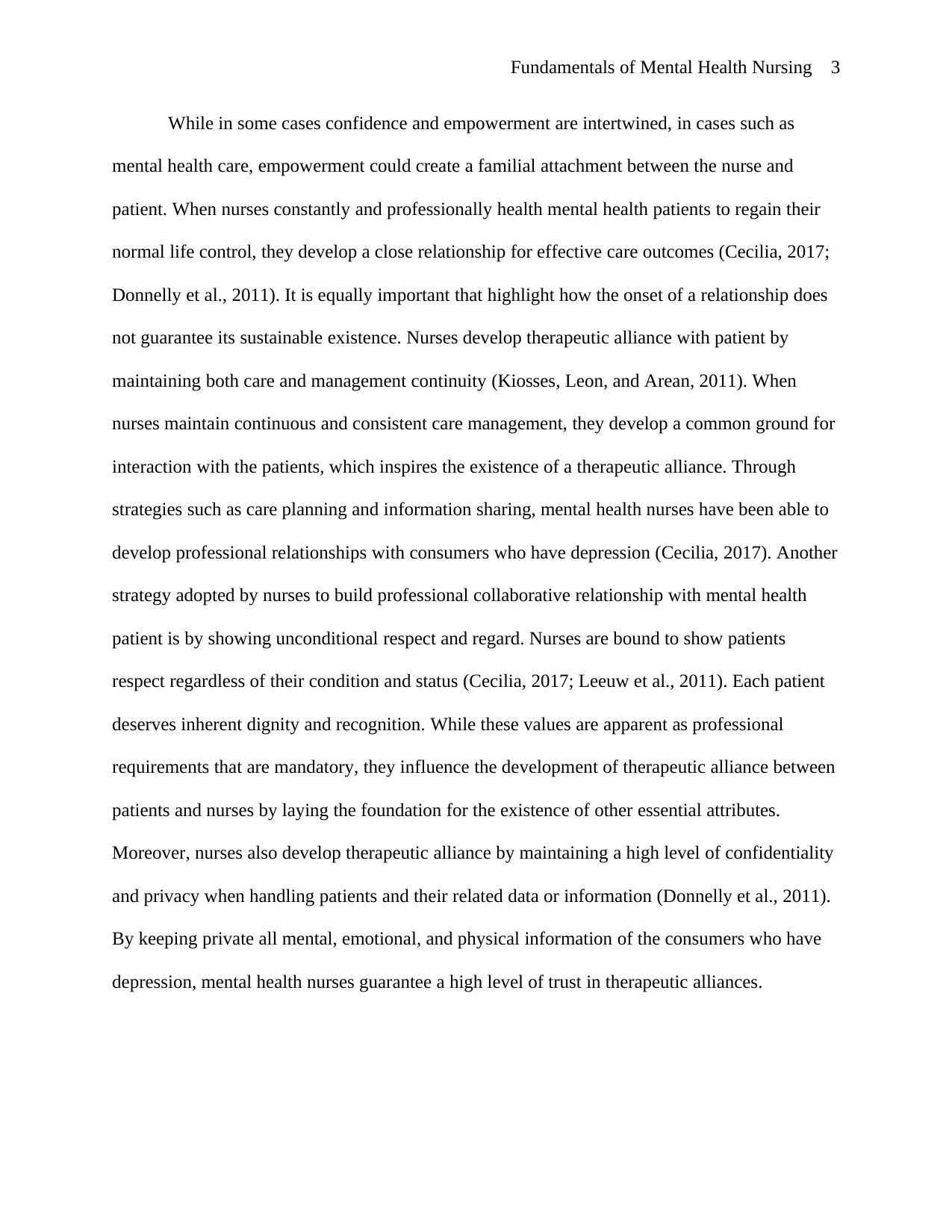
Fundamentals of Mental Health Nursing 3
While in some cases confidence and empowerment are intertwined, in cases such as
mental health care, empowerment could create a familial attachment between the nurse and
patient. When nurses constantly and professionally health mental health patients to regain their
normal life control, they develop a close relationship for effective care outcomes (Cecilia, 2017;
Donnelly et al., 2011). It is equally important that highlight how the onset of a relationship does
not guarantee its sustainable existence. Nurses develop therapeutic alliance with patient by
maintaining both care and management continuity (Kiosses, Leon, and Arean, 2011). When
nurses maintain continuous and consistent care management, they develop a common ground for
interaction with the patients, which inspires the existence of a therapeutic alliance. Through
strategies such as care planning and information sharing, mental health nurses have been able to
develop professional relationships with consumers who have depression (Cecilia, 2017). Another
strategy adopted by nurses to build professional collaborative relationship with mental health
patient is by showing unconditional respect and regard. Nurses are bound to show patients
respect regardless of their condition and status (Cecilia, 2017; Leeuw et al., 2011). Each patient
deserves inherent dignity and recognition. While these values are apparent as professional
requirements that are mandatory, they influence the development of therapeutic alliance between
patients and nurses by laying the foundation for the existence of other essential attributes.
Moreover, nurses also develop therapeutic alliance by maintaining a high level of confidentiality
and privacy when handling patients and their related data or information (Donnelly et al., 2011).
By keeping private all mental, emotional, and physical information of the consumers who have
depression, mental health nurses guarantee a high level of trust in therapeutic alliances.
While in some cases confidence and empowerment are intertwined, in cases such as
mental health care, empowerment could create a familial attachment between the nurse and
patient. When nurses constantly and professionally health mental health patients to regain their
normal life control, they develop a close relationship for effective care outcomes (Cecilia, 2017;
Donnelly et al., 2011). It is equally important that highlight how the onset of a relationship does
not guarantee its sustainable existence. Nurses develop therapeutic alliance with patient by
maintaining both care and management continuity (Kiosses, Leon, and Arean, 2011). When
nurses maintain continuous and consistent care management, they develop a common ground for
interaction with the patients, which inspires the existence of a therapeutic alliance. Through
strategies such as care planning and information sharing, mental health nurses have been able to
develop professional relationships with consumers who have depression (Cecilia, 2017). Another
strategy adopted by nurses to build professional collaborative relationship with mental health
patient is by showing unconditional respect and regard. Nurses are bound to show patients
respect regardless of their condition and status (Cecilia, 2017; Leeuw et al., 2011). Each patient
deserves inherent dignity and recognition. While these values are apparent as professional
requirements that are mandatory, they influence the development of therapeutic alliance between
patients and nurses by laying the foundation for the existence of other essential attributes.
Moreover, nurses also develop therapeutic alliance by maintaining a high level of confidentiality
and privacy when handling patients and their related data or information (Donnelly et al., 2011).
By keeping private all mental, emotional, and physical information of the consumers who have
depression, mental health nurses guarantee a high level of trust in therapeutic alliances.
⊘ This is a preview!⊘
Do you want full access?
Subscribe today to unlock all pages.

Trusted by 1+ million students worldwide
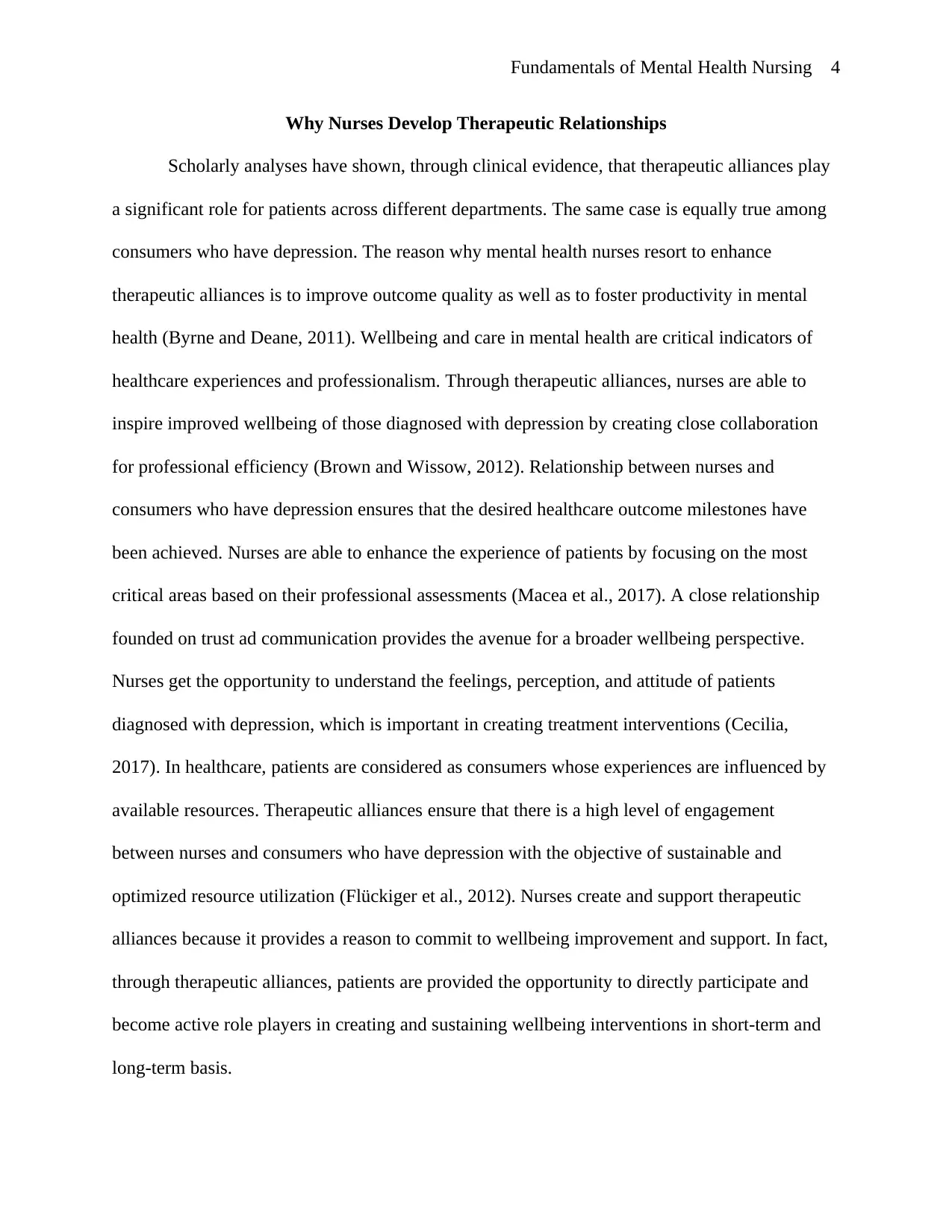
Fundamentals of Mental Health Nursing 4
Why Nurses Develop Therapeutic Relationships
Scholarly analyses have shown, through clinical evidence, that therapeutic alliances play
a significant role for patients across different departments. The same case is equally true among
consumers who have depression. The reason why mental health nurses resort to enhance
therapeutic alliances is to improve outcome quality as well as to foster productivity in mental
health (Byrne and Deane, 2011). Wellbeing and care in mental health are critical indicators of
healthcare experiences and professionalism. Through therapeutic alliances, nurses are able to
inspire improved wellbeing of those diagnosed with depression by creating close collaboration
for professional efficiency (Brown and Wissow, 2012). Relationship between nurses and
consumers who have depression ensures that the desired healthcare outcome milestones have
been achieved. Nurses are able to enhance the experience of patients by focusing on the most
critical areas based on their professional assessments (Macea et al., 2017). A close relationship
founded on trust ad communication provides the avenue for a broader wellbeing perspective.
Nurses get the opportunity to understand the feelings, perception, and attitude of patients
diagnosed with depression, which is important in creating treatment interventions (Cecilia,
2017). In healthcare, patients are considered as consumers whose experiences are influenced by
available resources. Therapeutic alliances ensure that there is a high level of engagement
between nurses and consumers who have depression with the objective of sustainable and
optimized resource utilization (Flückiger et al., 2012). Nurses create and support therapeutic
alliances because it provides a reason to commit to wellbeing improvement and support. In fact,
through therapeutic alliances, patients are provided the opportunity to directly participate and
become active role players in creating and sustaining wellbeing interventions in short-term and
long-term basis.
Why Nurses Develop Therapeutic Relationships
Scholarly analyses have shown, through clinical evidence, that therapeutic alliances play
a significant role for patients across different departments. The same case is equally true among
consumers who have depression. The reason why mental health nurses resort to enhance
therapeutic alliances is to improve outcome quality as well as to foster productivity in mental
health (Byrne and Deane, 2011). Wellbeing and care in mental health are critical indicators of
healthcare experiences and professionalism. Through therapeutic alliances, nurses are able to
inspire improved wellbeing of those diagnosed with depression by creating close collaboration
for professional efficiency (Brown and Wissow, 2012). Relationship between nurses and
consumers who have depression ensures that the desired healthcare outcome milestones have
been achieved. Nurses are able to enhance the experience of patients by focusing on the most
critical areas based on their professional assessments (Macea et al., 2017). A close relationship
founded on trust ad communication provides the avenue for a broader wellbeing perspective.
Nurses get the opportunity to understand the feelings, perception, and attitude of patients
diagnosed with depression, which is important in creating treatment interventions (Cecilia,
2017). In healthcare, patients are considered as consumers whose experiences are influenced by
available resources. Therapeutic alliances ensure that there is a high level of engagement
between nurses and consumers who have depression with the objective of sustainable and
optimized resource utilization (Flückiger et al., 2012). Nurses create and support therapeutic
alliances because it provides a reason to commit to wellbeing improvement and support. In fact,
through therapeutic alliances, patients are provided the opportunity to directly participate and
become active role players in creating and sustaining wellbeing interventions in short-term and
long-term basis.
Paraphrase This Document
Need a fresh take? Get an instant paraphrase of this document with our AI Paraphraser
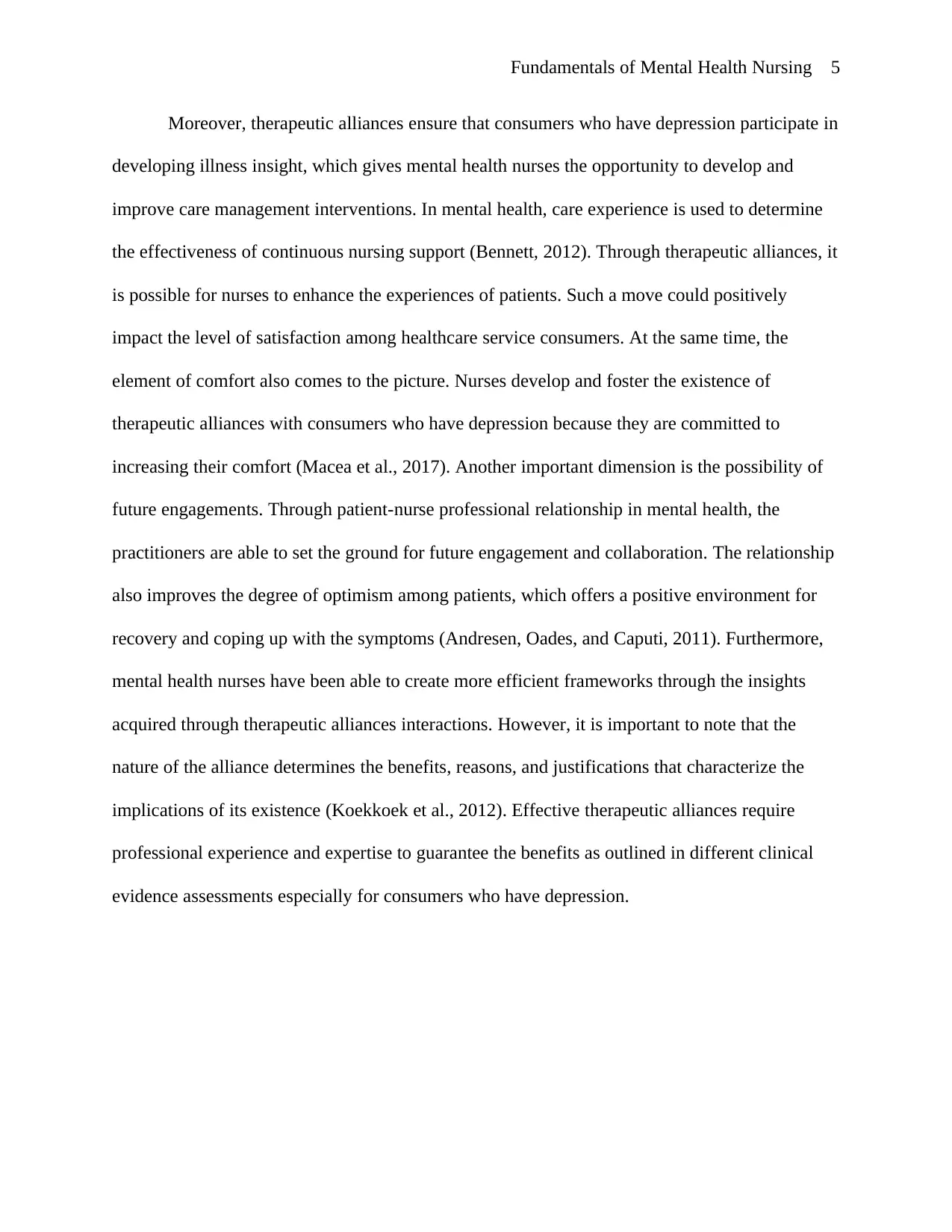
Fundamentals of Mental Health Nursing 5
Moreover, therapeutic alliances ensure that consumers who have depression participate in
developing illness insight, which gives mental health nurses the opportunity to develop and
improve care management interventions. In mental health, care experience is used to determine
the effectiveness of continuous nursing support (Bennett, 2012). Through therapeutic alliances, it
is possible for nurses to enhance the experiences of patients. Such a move could positively
impact the level of satisfaction among healthcare service consumers. At the same time, the
element of comfort also comes to the picture. Nurses develop and foster the existence of
therapeutic alliances with consumers who have depression because they are committed to
increasing their comfort (Macea et al., 2017). Another important dimension is the possibility of
future engagements. Through patient-nurse professional relationship in mental health, the
practitioners are able to set the ground for future engagement and collaboration. The relationship
also improves the degree of optimism among patients, which offers a positive environment for
recovery and coping up with the symptoms (Andresen, Oades, and Caputi, 2011). Furthermore,
mental health nurses have been able to create more efficient frameworks through the insights
acquired through therapeutic alliances interactions. However, it is important to note that the
nature of the alliance determines the benefits, reasons, and justifications that characterize the
implications of its existence (Koekkoek et al., 2012). Effective therapeutic alliances require
professional experience and expertise to guarantee the benefits as outlined in different clinical
evidence assessments especially for consumers who have depression.
Moreover, therapeutic alliances ensure that consumers who have depression participate in
developing illness insight, which gives mental health nurses the opportunity to develop and
improve care management interventions. In mental health, care experience is used to determine
the effectiveness of continuous nursing support (Bennett, 2012). Through therapeutic alliances, it
is possible for nurses to enhance the experiences of patients. Such a move could positively
impact the level of satisfaction among healthcare service consumers. At the same time, the
element of comfort also comes to the picture. Nurses develop and foster the existence of
therapeutic alliances with consumers who have depression because they are committed to
increasing their comfort (Macea et al., 2017). Another important dimension is the possibility of
future engagements. Through patient-nurse professional relationship in mental health, the
practitioners are able to set the ground for future engagement and collaboration. The relationship
also improves the degree of optimism among patients, which offers a positive environment for
recovery and coping up with the symptoms (Andresen, Oades, and Caputi, 2011). Furthermore,
mental health nurses have been able to create more efficient frameworks through the insights
acquired through therapeutic alliances interactions. However, it is important to note that the
nature of the alliance determines the benefits, reasons, and justifications that characterize the
implications of its existence (Koekkoek et al., 2012). Effective therapeutic alliances require
professional experience and expertise to guarantee the benefits as outlined in different clinical
evidence assessments especially for consumers who have depression.
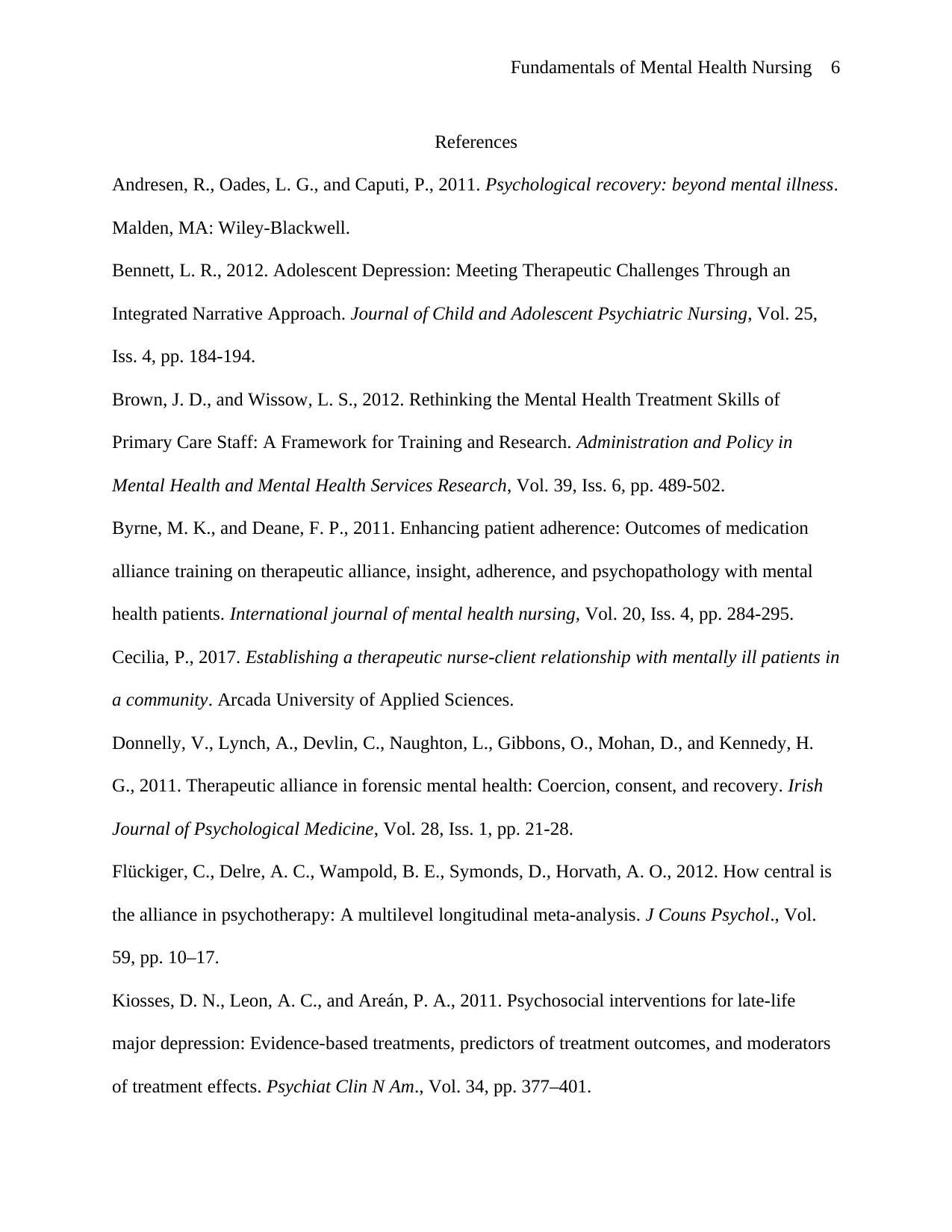
Fundamentals of Mental Health Nursing 6
References
Andresen, R., Oades, L. G., and Caputi, P., 2011. Psychological recovery: beyond mental illness.
Malden, MA: Wiley-Blackwell.
Bennett, L. R., 2012. Adolescent Depression: Meeting Therapeutic Challenges Through an
Integrated Narrative Approach. Journal of Child and Adolescent Psychiatric Nursing, Vol. 25,
Iss. 4, pp. 184-194.
Brown, J. D., and Wissow, L. S., 2012. Rethinking the Mental Health Treatment Skills of
Primary Care Staff: A Framework for Training and Research. Administration and Policy in
Mental Health and Mental Health Services Research, Vol. 39, Iss. 6, pp. 489-502.
Byrne, M. K., and Deane, F. P., 2011. Enhancing patient adherence: Outcomes of medication
alliance training on therapeutic alliance, insight, adherence, and psychopathology with mental
health patients. International journal of mental health nursing, Vol. 20, Iss. 4, pp. 284-295.
Cecilia, P., 2017. Establishing a therapeutic nurse-client relationship with mentally ill patients in
a community. Arcada University of Applied Sciences.
Donnelly, V., Lynch, A., Devlin, C., Naughton, L., Gibbons, O., Mohan, D., and Kennedy, H.
G., 2011. Therapeutic alliance in forensic mental health: Coercion, consent, and recovery. Irish
Journal of Psychological Medicine, Vol. 28, Iss. 1, pp. 21-28.
Flückiger, C., Delre, A. C., Wampold, B. E., Symonds, D., Horvath, A. O., 2012. How central is
the alliance in psychotherapy: A multilevel longitudinal meta-analysis. J Couns Psychol., Vol.
59, pp. 10–17.
Kiosses, D. N., Leon, A. C., and Areán, P. A., 2011. Psychosocial interventions for late-life
major depression: Evidence-based treatments, predictors of treatment outcomes, and moderators
of treatment effects. Psychiat Clin N Am., Vol. 34, pp. 377–401.
References
Andresen, R., Oades, L. G., and Caputi, P., 2011. Psychological recovery: beyond mental illness.
Malden, MA: Wiley-Blackwell.
Bennett, L. R., 2012. Adolescent Depression: Meeting Therapeutic Challenges Through an
Integrated Narrative Approach. Journal of Child and Adolescent Psychiatric Nursing, Vol. 25,
Iss. 4, pp. 184-194.
Brown, J. D., and Wissow, L. S., 2012. Rethinking the Mental Health Treatment Skills of
Primary Care Staff: A Framework for Training and Research. Administration and Policy in
Mental Health and Mental Health Services Research, Vol. 39, Iss. 6, pp. 489-502.
Byrne, M. K., and Deane, F. P., 2011. Enhancing patient adherence: Outcomes of medication
alliance training on therapeutic alliance, insight, adherence, and psychopathology with mental
health patients. International journal of mental health nursing, Vol. 20, Iss. 4, pp. 284-295.
Cecilia, P., 2017. Establishing a therapeutic nurse-client relationship with mentally ill patients in
a community. Arcada University of Applied Sciences.
Donnelly, V., Lynch, A., Devlin, C., Naughton, L., Gibbons, O., Mohan, D., and Kennedy, H.
G., 2011. Therapeutic alliance in forensic mental health: Coercion, consent, and recovery. Irish
Journal of Psychological Medicine, Vol. 28, Iss. 1, pp. 21-28.
Flückiger, C., Delre, A. C., Wampold, B. E., Symonds, D., Horvath, A. O., 2012. How central is
the alliance in psychotherapy: A multilevel longitudinal meta-analysis. J Couns Psychol., Vol.
59, pp. 10–17.
Kiosses, D. N., Leon, A. C., and Areán, P. A., 2011. Psychosocial interventions for late-life
major depression: Evidence-based treatments, predictors of treatment outcomes, and moderators
of treatment effects. Psychiat Clin N Am., Vol. 34, pp. 377–401.
⊘ This is a preview!⊘
Do you want full access?
Subscribe today to unlock all pages.

Trusted by 1+ million students worldwide
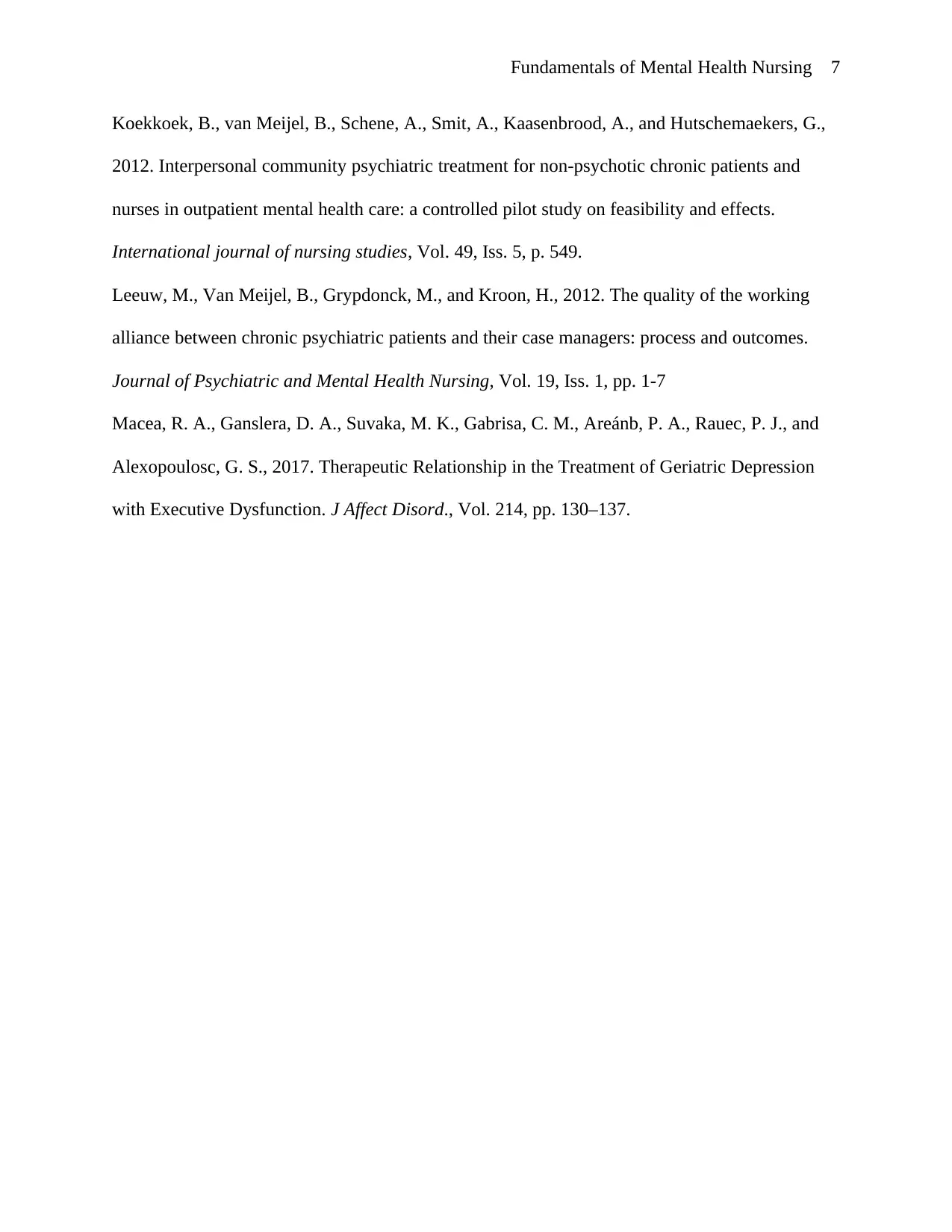
Fundamentals of Mental Health Nursing 7
Koekkoek, B., van Meijel, B., Schene, A., Smit, A., Kaasenbrood, A., and Hutschemaekers, G.,
2012. Interpersonal community psychiatric treatment for non-psychotic chronic patients and
nurses in outpatient mental health care: a controlled pilot study on feasibility and effects.
International journal of nursing studies, Vol. 49, Iss. 5, p. 549.
Leeuw, M., Van Meijel, B., Grypdonck, M., and Kroon, H., 2012. The quality of the working
alliance between chronic psychiatric patients and their case managers: process and outcomes.
Journal of Psychiatric and Mental Health Nursing, Vol. 19, Iss. 1, pp. 1-7
Macea, R. A., Ganslera, D. A., Suvaka, M. K., Gabrisa, C. M., Areánb, P. A., Rauec, P. J., and
Alexopoulosc, G. S., 2017. Therapeutic Relationship in the Treatment of Geriatric Depression
with Executive Dysfunction. J Affect Disord., Vol. 214, pp. 130–137.
Koekkoek, B., van Meijel, B., Schene, A., Smit, A., Kaasenbrood, A., and Hutschemaekers, G.,
2012. Interpersonal community psychiatric treatment for non-psychotic chronic patients and
nurses in outpatient mental health care: a controlled pilot study on feasibility and effects.
International journal of nursing studies, Vol. 49, Iss. 5, p. 549.
Leeuw, M., Van Meijel, B., Grypdonck, M., and Kroon, H., 2012. The quality of the working
alliance between chronic psychiatric patients and their case managers: process and outcomes.
Journal of Psychiatric and Mental Health Nursing, Vol. 19, Iss. 1, pp. 1-7
Macea, R. A., Ganslera, D. A., Suvaka, M. K., Gabrisa, C. M., Areánb, P. A., Rauec, P. J., and
Alexopoulosc, G. S., 2017. Therapeutic Relationship in the Treatment of Geriatric Depression
with Executive Dysfunction. J Affect Disord., Vol. 214, pp. 130–137.
1 out of 7
Related Documents
Your All-in-One AI-Powered Toolkit for Academic Success.
+13062052269
info@desklib.com
Available 24*7 on WhatsApp / Email
![[object Object]](/_next/static/media/star-bottom.7253800d.svg)
Unlock your academic potential
Copyright © 2020–2026 A2Z Services. All Rights Reserved. Developed and managed by ZUCOL.





